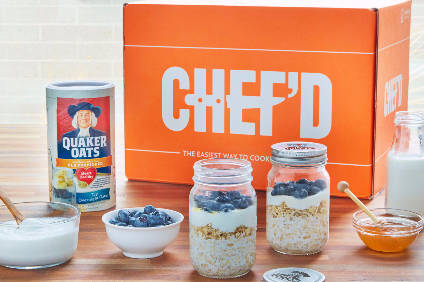Meal kits have carved out a niche in the US but, Victor Martino, just-food’s new Stateside columnist, argues that is all they will hold in the country’s food market for the foreseeable future, for all the claims of the products having reinvented the dinner ritual and despite the interest from some major CPG brands.
Never underestimate the power of good public relations. I don’t.
Case in point: the fledgling US meal-kit market. Research firm Packaged Facts estimates the US meal-kit market’s value at about US$1.5bn. While that’s enough annual revenue to not write-off the nascent meal-kit space – the first start-ups launched in 2012 – as a mere hobby, it is a fraction of total annual food sales (retail, foodservice and other channels) in the US, which according to the USDA Economic Research Service was $5.2trn in 2015.
Packaged Facts estimates the US meal-kit market will double to about $3bn annually in five years. That will be positive news if it happens – but it is still hardly a significant enough share of the total US food market to make much of a significant difference.
At $1.5bn, the meal-kit market also does not warrant all the media attention it has been getting of late. But, never undervalue the effectiveness of good PR.
The most recent and interesting development in the meal-kit space is the roll out of meal-kit products and services by big-name packaged foods brands like Campbell Soup Co. Tyson Foods, Hershey, PepsiCo’s Quaker and some others.

US Tariffs are shifting - will you react or anticipate?
Don’t let policy changes catch you off guard. Stay proactive with real-time data and expert analysis.
By GlobalDataThe big packaged foods brands are getting into the meal-kit space primarily to hedge their bets in the event the market takes off. The big CPG players, in my opinion, also are reacting to the oversize amount (relative to the market size) of media attention – most of it generated by well-paid PR firms in order to generate investment money and consumer demand for meal-kits the start-ups are getting.
The primary benefit for big packaged foods brands entering the meal-kit market is as an adjunct to their overall brand marketing strategies. After all, potential meal-kit sales for a Tyson Foods, Quaker or Campbell Soup in a $1.5bn market are not going to amount to much in the grand scheme of things.
Meanwhile, US start-up Blue Apron, which according to research firm 1010data generates more than three times the sales of its closest competitor in the meal-kit space, has just launched a 60-second commercial called, “Better Food, From Scratch.” The spot positions its meal-kits not so much as a convenient alternative, the original positioning, but rather touts the fact Blue Apron has recently started working directly with farmers and small food producers to procure some of the ingredients for its meal kits. This repositioning suggests the convenience factor alone has not been enough for Blue Apron to build a profitable business on.
The meal-kit space will remain a small niche for the foreseeable future. It is nowhere near being the “future of food” as many pundits have suggested. In fact, starting this year, we should expect to see two key developments in the meal-kit startup space: outright failure among some of the smaller players, and consolidation; bigger startups acquiring smaller ones.
When it comes to the big brands, do not expect to see a whole lot of major activity from them in the meal-kit space this year. Rather, expect to see more of a ‘tinkering around the edges’ approach, which will primarily include launching a few new products and slightly expanding their respective programmes.
My suggestion is the major focus for big brands in the meal-kit space should be figuring out how to tie-in the meal-kit services with overall strategic brand marketing efforts. That’s where the best bang for the buck is right now.
just-food columnist Victor Martino is a California-based strategic marketing and business development consultant, analyst, entrepreneur and writer, specialising in the food and grocery industry. victormartino415@gmail.com / www.twitter.com/nsfoodsmemo.





